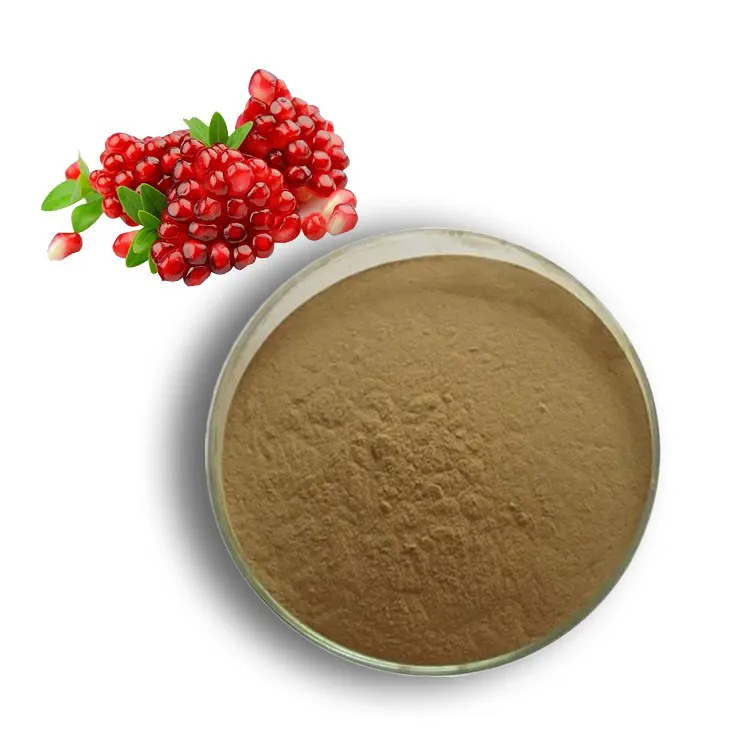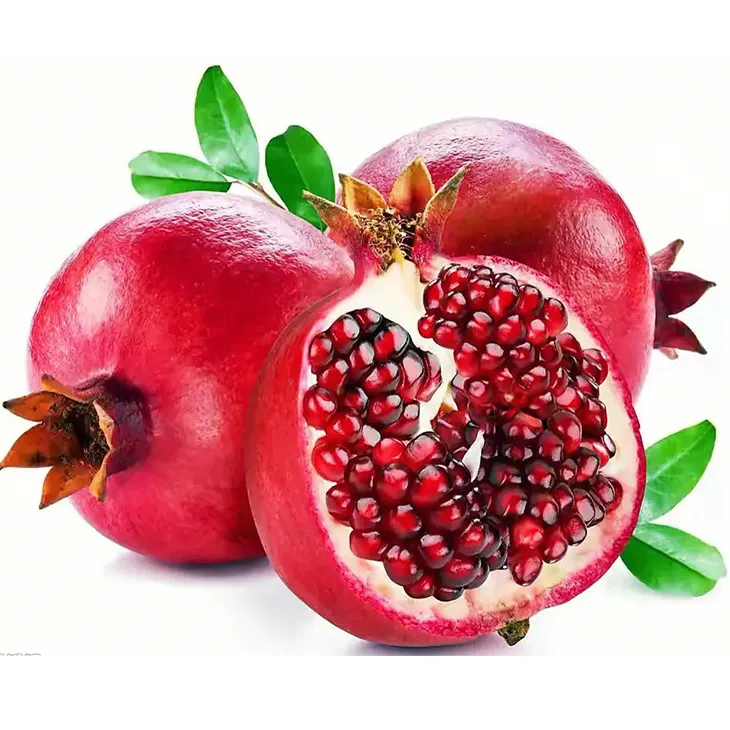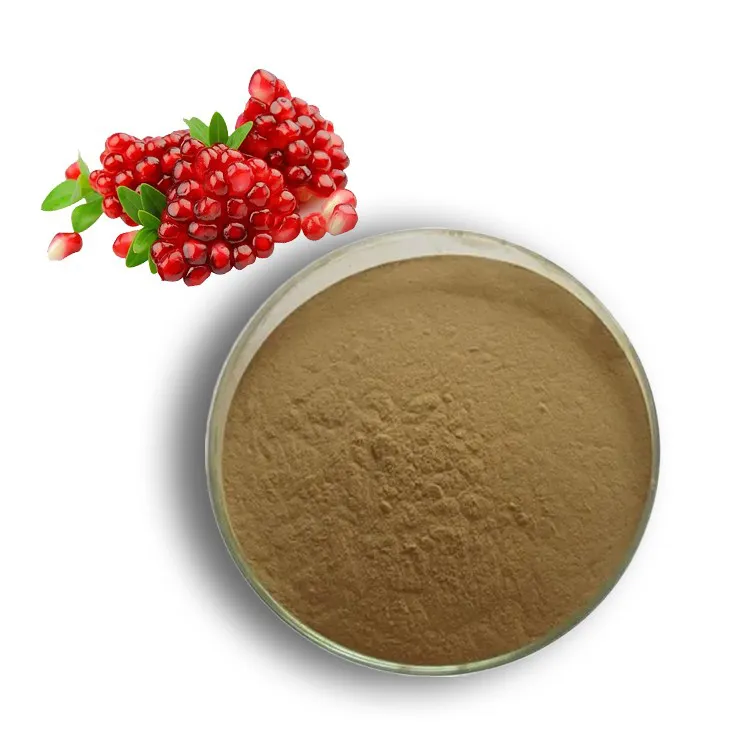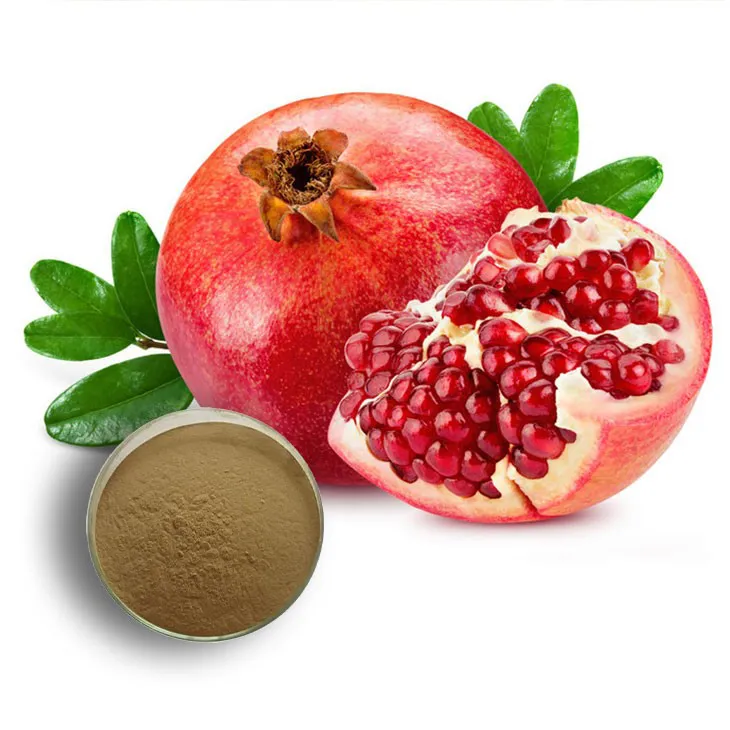- 0086-571-85302990
- sales@greenskybio.com
Bulk Manufacturers and Exporters of Pomegranate Extract.
2024-12-21

1. Introduction to Pomegranate Extract
Pomegranate Extract has emerged as a highly sought - after ingredient in recent years. Rich in antioxidants, such as polyphenols, it offers a plethora of health benefits. These antioxidants help in combating free radicals in the body, which are associated with various diseases and premature aging. In the health - supplement industry, Pomegranate Extract is believed to support heart health, improve blood circulation, and enhance the immune system. In the food - and - beverage sector, it adds a unique flavor and a healthy touch to products. In cosmetics, it is utilized for its potential to promote skin health, providing anti - aging and moisturizing effects.

2. The Role of Bulk Manufacturers
2.1 Raw Material Selection
The process of manufacturing pomegranate extract begins with the crucial step of raw material selection. Bulk manufacturers must be extremely meticulous in choosing high - quality pomegranates. They often source pomegranates from regions known for their excellent produce. For example, some areas with the right climate and soil conditions produce pomegranates with a higher concentration of beneficial compounds. Manufacturers need to consider factors such as the variety of pomegranate, its ripeness, and the absence of pesticides or contaminants. Only by starting with top - notch raw materials can they ensure the quality of the final extract.
2.2 Extraction Techniques
Once the pomegranates are selected, manufacturers employ advanced extraction techniques. There are several methods available, such as solvent extraction and supercritical fluid extraction.- Solvent extraction: This is a commonly used method. It involves using solvents like ethanol or water to extract the active compounds from the pomegranate. However, it requires careful control of the solvent - to - raw - material ratio and extraction time to ensure the purity and potency of the extract. After extraction, the solvent needs to be removed completely to obtain a pure extract.
- Supercritical fluid extraction: This is a more advanced and environmentally friendly technique. Supercritical carbon dioxide is used as the extraction fluid. It has the advantage of being able to extract the desired compounds without leaving any toxic residues. It also allows for better control over the extraction process, resulting in a more consistent quality of the extract.
2.3 Quality Control
Quality control is an integral part of the manufacturing process. Manufacturers need to conduct various tests on the pomegranate extract at different stages of production.- Purity analysis: This involves determining the percentage of active compounds in the extract. High - performance liquid chromatography (HPLC) is often used to accurately measure the levels of polyphenols and other key components.
- Microbial testing: To ensure that the extract is free from harmful bacteria, fungi, and other microorganisms. Any contamination can pose a serious risk to consumers, especially in products like health supplements and food - and - beverage items.
- Heavy metal testing: Pomegranate extract should be free from excessive levels of heavy metals such as lead, mercury, and cadmium. These metals can accumulate in the body and cause various health problems.

3. The Significance of Exporters
3.1 Meeting International Standards
Export - oriented manufacturers of pomegranate extract face the challenge of complying with international quality and safety standards. Different countries have their own regulations regarding food additives, health supplements, and cosmetics. For example, in the European Union, products containing pomegranate extract must meet strict safety and labeling requirements. In the United States, the Food and Drug Administration (FDA) has specific guidelines for dietary supplements. Exporters need to ensure that their products are in line with these regulations to gain access to global markets. This may involve obtaining certifications such as Good Manufacturing Practice (GMP) and Hazard Analysis and Critical Control Points (HACCP).
3.2 Market Expansion
By exporting pomegranate extract, manufacturers can tap into a much larger market. The global demand for health - promoting products is on the rise, and pomegranate extract has the potential to be a popular ingredient worldwide. Exporters can target different regions based on their market needs. For instance, in Asian markets, there is a growing interest in natural health supplements, while in Western markets, the demand for functional foods and beverages containing pomegranate extract is increasing. Through effective marketing and distribution strategies, exporters can increase the market share of pomegranate extract in different parts of the world.
3.3 Contribution to Global Industries
Pomegranate extract exporters play a vital role in the growth of the health - supplement, food - and - beverage, and cosmetic industries on a global scale.- In the health - supplement industry, the export of pomegranate extract provides consumers around the world with access to a product that may support their overall well - being. This helps in promoting the use of natural and plant - based supplements, which is a growing trend.
- In the food - and - beverage industry, exporters enable the incorporation of pomegranate extract into a wide range of products, from juices and smoothies to energy bars. This not only adds a unique flavor but also a healthy image to these products, attracting more consumers.
- In the cosmetic industry, the export of pomegranate extract allows for the development of innovative skincare and haircare products. As consumers become more conscious of the ingredients in their cosmetics, pomegranate extract - based products are likely to gain more popularity.

4. Challenges Faced by Manufacturers and Exporters
4.1 Supply Chain Disruptions
One of the major challenges faced by pomegranate extract manufacturers and exporters is supply chain disruptions. Pomegranates are seasonal fruits, and any unforeseen events such as bad weather, natural disasters, or political unrest in the growing regions can affect the supply of raw materials. This can lead to shortages of pomegranate extract in the market. Additionally, transportation issues, such as delays in shipping or problems at ports, can also disrupt the supply chain and impact the timely delivery of products to customers.
4.2 Price Fluctuations
The price of pomegranates can be highly volatile, depending on factors such as crop yields, market demand, and competition. Since pomegranate extract manufacturers rely on a stable supply of pomegranates at a reasonable cost, price fluctuations can pose a significant challenge. A sudden increase in the price of pomegranates can lead to higher production costs for the extract, which may in turn affect the profitability of manufacturers and exporters. They need to find ways to manage these price fluctuations, such as through long - term contracts with suppliers or by diversifying their sources of raw materials.
4.3 Competition
The market for pomegranate extract is becoming increasingly competitive. There are numerous manufacturers and exporters vying for a share of the global market. Some competitors may offer lower - priced products, which can be a threat to those aiming for high - quality production. To stay competitive, manufacturers and exporters need to focus on product differentiation. This can be achieved through continuous research and development to improve the quality and efficacy of the pomegranate extract, as well as through effective branding and marketing strategies.
5. Future Outlook
Despite the challenges, the future looks promising for pomegranate extract manufacturers and exporters.
5.1 Technological Advancements
Continued technological advancements in extraction techniques are expected. New methods may be developed that are more efficient, cost - effective, and environmentally friendly. For example, research is being conducted on enzyme - assisted extraction, which could potentially improve the yield and quality of pomegranate extract. These technological improvements will enable manufacturers to produce higher - quality extracts at a lower cost, enhancing their competitiveness in the global market.
5.2 Growing Market Demand
The market demand for pomegranate extract is likely to keep growing. As consumers become more health - conscious and seek natural alternatives to synthetic products, the popularity of pomegranate extract in health - supplements, food - and - beverage, and cosmetics is expected to increase. This growing demand will provide more opportunities for manufacturers and exporters to expand their businesses. Moreover, emerging markets, especially in developing countries, offer untapped potential for the growth of pomegranate extract sales.
5.3 Product Diversification
Manufacturers and exporters can also look forward to product diversification. They can explore new applications for pomegranate extract, such as in the pharmaceutical industry or in nutraceuticals. By diversifying their product range, they can reduce their dependence on a single market segment and spread their risks. Additionally, they can develop value - added products, such as encapsulated pomegranate extract for easier consumption or pomegranate - extract - infused skincare products with enhanced efficacy.FAQ:
1. What are the main health - promoting properties of pomegranate extract?
Pomegranate extract is rich in antioxidants such as polyphenols, which can help combat oxidative stress in the body. It may also have anti - inflammatory properties, potentially beneficial for heart health by reducing blood pressure and cholesterol levels. Additionally, it could play a role in skin health, promoting collagen production and providing anti - aging effects.
2. How do bulk manufacturers ensure the quality of pomegranate extract?
Manufacturers start by carefully selecting high - quality pomegranates. They use advanced extraction techniques that are precisely controlled to preserve the active compounds. Regular quality control checks are carried out throughout the production process, including testing for purity, potency, and absence of contaminants. They also adhere to strict manufacturing guidelines and may be certified by relevant quality assurance bodies.
3. What are the international quality and safety standards for exporting pomegranate extract?
Standards can vary depending on the destination market. However, common requirements include compliance with Good Manufacturing Practice (GMP) regulations. There are often limits on the levels of heavy metals, pesticides, and microbial contaminants. The extract may need to meet specific purity and identity criteria, and proper labeling and packaging regulations must be followed to ensure consumer safety and accurate product information.
4. How does pomegranate extract contribute to the food - and - beverage industry?
In the food - and - beverage industry, pomegranate extract can be used as a natural flavor enhancer and colorant. It adds a unique fruity flavor and a rich red color to products. Its health - promoting properties also make it an attractive ingredient for functional foods and beverages, such as juices, smoothies, and dietary supplements.
5. What are the challenges faced by pomegranate extract exporters?
Exporters may face challenges such as fluctuating raw material prices and availability, as pomegranate production can be affected by factors like climate and pests. Meeting diverse international quality and safety standards in different markets can be complex and costly. There may also be competition from other regions or substitute products. Additionally, ensuring proper storage and transportation conditions to maintain the quality of the extract during transit is a concern.
Related literature
- Pomegranate Extract: Production, Properties and Applications"
- "The Role of Pomegranate Extract in the Global Health - Supplement Market"
- "Quality Assurance in Pomegranate Extract Manufacturing for Export"
- ▶ Hesperidin
- ▶ Citrus Bioflavonoids
- ▶ Plant Extract
- ▶ lycopene
- ▶ Diosmin
- ▶ Grape seed extract
- ▶ Sea buckthorn Juice Powder
- ▶ Fruit Juice Powder
- ▶ Hops Extract
- ▶ Artichoke Extract
- ▶ Mushroom extract
- ▶ Astaxanthin
- ▶ Green Tea Extract
- ▶ Curcumin
- ▶ Horse Chestnut Extract
- ▶ Other Product
- ▶ Boswellia Serrata Extract
- ▶ Resveratrol
- ▶ Marigold Extract
- ▶ Grape Leaf Extract
- ▶ New Product
- ▶ Aminolevulinic acid
- ▶ Cranberry Extract
- ▶ Red Yeast Rice
- ▶ Red Wine Extract
-
Curcumin
2024-12-21
-
Mulberry Extract
2024-12-21
-
Sea buckthorn oil
2024-12-21
-
Almond Extract Powder
2024-12-21
-
Curcuma Longa Extract
2024-12-21
-
Lily extract
2024-12-21
-
Feverfew Extract
2024-12-21
-
Pueraria Lobata Extract
2024-12-21
-
Avocado Extract Powder
2024-12-21
-
Withania Somnifera Extract
2024-12-21





















